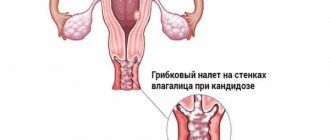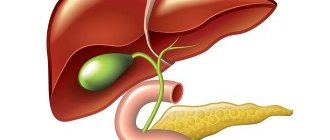About the causative agent of the disease
Normally, fungi of the genus Candida coexist peacefully with humans, living on the skin and mucous membranes, including the vaginal mucosa in women. The pathogen exhibits its activity under certain circumstances, when favorable conditions appear for its growth and reproduction. Most often, thrush is caused by Candida albicans, one of one hundred and seventy representatives of this genus.
The transition of the disease to a chronic form, with frequent relapses and complications, occurs if it is caused by the fungus Candida non-albicans. In these cases, it is necessary to treat thrush using non-standard regimens, because conventional antifungal therapy is ineffective.
https://youtu.be/Sd75fMOCPB0
How does thrush manifest?
This disease occurs not only in women, it occurs in both men and children. Pregnant women and girls who have not had sexual experience also suffer from vaginal candidiasis. Symptoms of male thrush do not manifest themselves clearly; most often it has a hidden course.
The main sign of the onset of the disease in women is atypical vaginal discharge. At the beginning of a fungal infection, the discharge is cloudy and white, but after a day or two it acquires a characteristic cheesy consistency and becomes thick.
Additional symptoms of thrush:
- itching and burning in the vagina, spreading to the external genitalia;
- swelling of the vulva and labia minora;
- the appearance of a white coating in the form of curdled plaques on the external genitalia;
- pain during urination and sexual intercourse.
These signs of the disease are usually not accompanied by hyperthermia. If the body temperature still exceeds the norm, then most likely an inflammatory process has joined the fungal infection.
If thrush is not treated, the process becomes chronic, complications arise: vaginal colpitis, cystitis, fungal infection of the intestines. Complications of this disease are especially dangerous for pregnant women:
- spread of the fungal process to the placenta;
- premature birth;
- spontaneous abortion during pregnancy up to 12 weeks;
- infection of the child during childbirth.
In newborns infected by their mother, lesions are observed in the mucous membranes of the mouth, intestines, and upper respiratory tract. The symptoms of this disease in girls who have no experience of sexual activity do not differ from the signs of a fungal infection that appear in women. In rare cases, men experience:
- white plaque on the head of the genital organ;
- redness and swelling of the foreskin;
- burning and itching;
- pain during sexual intercourse and urination.
Important: only a doctor can evaluate the symptoms of the disease and make a correct diagnosis, prescribe treatment: a gynecologist, a dermatologist - a venereologist. Self-medication is unacceptable, since symptoms similar to thrush are present in gonorrhea, genital herpes, gardnerellosis, and trichomoniasis.
Is treatment necessary for your sexual partner?
The partner needs to contact a urologist and get tested for flora if he has symptoms of thrush, namely:
- formation of cracks on the head of the penis;
- itching;
- white plaque in the intimate area;
- pain during urination;
- redness.
The necessary treatment should only be prescribed by a doctor.
If your sexual partner has no signs of candidiasis and he feels great, then it is stupid to stuff him with medications. This does not affect the effectiveness of treatment of thrush in women and the speed of its recovery.
Causes of fungal infection of the genital organs
The treatment process for the initial stage of this disease takes one to two days. In order to prevent the development of candidiasis, you need to know why thrush appears and what are the features of the activation of the pathological process.
Dietary disorders
The predominance of foods in the menu that affect the growth of yeast is one of the reasons for the appearance of thrush. It can be provoked in a similar way in young girls who have never had sexual intercourse. Eating large amounts of sweet and starchy foods inhibits the work of bifidobacteria and lactobacilli, which create a balance of microflora.
With a decrease in their activity, the rapid development of pathogenic bacteria and microorganisms, including fungi, occurs. Prevention of thrush in this case consists of avoiding sweets, baked goods, beer, kvass, smoked meats and pickles. The glucose contained in these products is fertile ground for the growth of fungi.
Hormonal imbalance
Hormonal changes in the female body are the reason for the appearance of thrush. It can be expected in case of menstrual irregularities, before the appearance of the first menstruation in young girls, before the onset of menopause, and during certain periods of the menstrual cycle. All these conditions are associated with an increase in the main female hormone - estrogen. It provokes the proliferation of the fungus and, as a result, the appearance of the disease.
Contraceptives with a high estrogen content have the same effect on the body of some women. You should not think that thrush occurs in everyone who takes oral contraceptives, but the risk of its occurrence is higher in those who started taking the drug or changed it to pills with a high dose of estrogen.
Pregnancy and thrush
Most pregnant women suffer from this disease or become carriers of it. This spread of vaginal candidiasis in pregnant women is explained by several reasons:
- An increase in estrogen levels throughout pregnancy shifts the balance of the vaginal environment, making it more acidic, perfect for the growth of fungus;
- the increased load on the body of pregnant women reduces immunity, the body’s response to the rapid proliferation of the fungus is not adequate to the danger;
- changes in the diet of pregnant women, non-compliance with the diet, and excess of sweet and starchy foods create the ground for the development of fungi.
The danger to the health of pregnant women and their unborn children is so great that the gynecologist must offer treatment for this disease. There are safe medications available for the treatment of vaginal candidiasis in pregnant women.
Intimate hygiene disorders
This disease can be provoked by wearing synthetic underwear, rarely changing pads during menstruation, excessive use of panty liners, and the use of sanitary tampons. The “greenhouse effect” created in these cases in the area of the external genitalia and in the vagina is an excellent breeding ground for the development of vaginal candidiasis.
The wrong way of washing can become a provoking factor for the development of thrush.
It is caused by her excessive fascination with intimate hygiene foams, soaps and gels, which changes the balance of the vaginal microflora. A stream of water directed from bottom to top when washing, often, together with other factors, contributes to the occurrence of the disease. This method of intimate hygiene is especially dangerous for pregnant women.
Incorrectly selected mechanical means of contraception is another reason for the development of the pathological process. Condoms, vaginal rings and other barrier methods of protection, when in contact with the vaginal environment, cause its response to irritation in the form of a change in the balance of microflora. After using certain types of spermicides that are not suitable for a woman, it is necessary to treat the manifestations of thrush.
Diabetes
Stress and chronic fatigue
This connection between thrush and constant emotional stress is not obvious at first glance. However, stress requires the body to release a hormone called cortisol. Maintaining all organs and systems in constant tone, due to its work, reduces immunity.
The body becomes defenseless against infections, including vaginal candidiasis. Chronic fatigue has the same effect on modern man.
Use of antibiotics
Particularly dangerous diseases need to be treated with antibiotics - sore throat, cystitis, pneumonia, inflammation of the female genital area, bronchitis, postoperative conditions. A side effect of this use is the death of bacteria that maintain an optimal balance of microflora and inhibit pathogenic microorganisms. The protection of the vagina from thrush decreases, and colonies of fungi grow.
Fungal infections are very insidious, and even with good treatment, it is not always possible to get rid of them completely. If men simply cope with candidiasis, then their companions have to suffer. In this publication we will tell you what are the most common causes of frequent thrush in women.
How to treat thrush
To treat severe thrush, there is a wide variety of drugs available in the pharmacy. All of them are antifungal, with a broad-spectrum active component. Available in the form of ointments, creams for external use, tablets, vaginal suppositories, suppositories.
- Fluconazole. Tablets for oral administration. The dosage is individual, no more than 400 mg per day. The maximum dose is taken once, then 50 mg every other day for 2 weeks. To prevent relapses, use 1 tablet per month for a whole year.
- Futsis . Tablets are taken 1 time at a dose of 150 mg, another 3 capsules at a dose of 50 mg every other day. For prevention every month in a minimum dose.
- Nystatin . Broad-spectrum antibiotic in various forms. The dosage of tablets and the duration of therapy are determined individually. The ointment is applied in a thin layer twice a day for 10 days. Suppositories are placed overnight for 10 days.
- Terzhinan . Vaginal suppositories with local action. The active components are absorbed by tissues and practically do not enter the bloodstream. Relief occurs after the first use. Duration of therapy is 10-14 days. The suppository is administered at night once a day. Livarol, Klion D, Rumizol are used in a similar scheme.
- Nuvaring . A combined hormonal drug that allows you to normalize the menstrual cycle and restore the balance of hormones. Suitable if severe thrush appears before menstruation and cannot be treated with antifungal agents. Available in the form of a vaginal ring. The action lasts for a month. To achieve lasting results, use six months or more. Side effects may occur; use must be under the supervision of specialists.
Treatment of severe thrush is a long, labor-intensive process, with an individual approach. For successful therapy, it is very important to understand the true causes of thrush. Perhaps getting rid of the unpleasant manifestations of candidiasis can only be done by strengthening the immune system. In this case, strong immunostimulants and modulators are used.
Frequent thrush - how is it?
Chronic candidiasis has periods of acute outbreaks and, conversely, times when it returns. For some women it returns 4 times a year or more. For some, it develops again within a few days after fairly successful treatment. The maximum break is three months. Some women even experience thrush literally before every menstruation.
Statistics in this regard are vague; according to various sources, from 5 to 25% of patients suffer from frequent thrush. By the way, if in a primary acute infection the causative agent in more than 90% of cases is Candida albicans, then with frequent outbreaks of fungal infection, up to 30% of cultures are found to contain another type of candida. This is precisely what causes the lack of effectiveness of therapy, since most antimycotic drugs are simply ineffective.
The symptoms of frequent thrush may be no different from its acute form, but in some cases the signs are less intense. It happens that the manifestations of such a disease are partial, when a woman is bothered by one or two symptoms, while even the characteristic curd-like discharge and plaque may simply not be present. Due to frequent attacks of fungal flora, the mucous membrane of the external genital organs changes: it becomes rough to the touch, brownish or brown in color, and lumpy.
Clinical picture of chronic thrush
We can talk about the chronic form of thrush only after the disease has lasted for at least 2 months. The chronic form of this disease is characterized by relapses at least 4 times a year; the next relapse should be expected no later than 3 months after the previous exacerbation of the disease. In general, the following features can be distinguished:
- Progressive course of the disease;
- The intensity of symptoms is mostly reduced (typical for a recurrent form), and may be completely asymptomatic;
- Often, a change in pigmentation is observed on the code (the skin is both darker and lighter in certain areas), partial thickening of the skin is possible;
- Traces of erosion appear on the skin - cracks, folds, infiltration, the skin itself acquires an unhealthy glossy shine;
- The skin around the vagina also turns red, but the primary symptoms (flaky discharge and plaque) are absent. The labia become dry and cracks may appear;
- There may be unpleasant itching in the vagina; with a persistent form of candidiasis, unpleasant sensations (itching, burning) can be very intense;
- Often vaginal thrush is accompanied by candidiasis from any other localization - in the stomach, intestines, oral cavity, etc.
The main causes of frequent thrush in women
There are risk factors due to which a fungal infection easily becomes chronic. Among them:
- Decreased immunity of women
It is the immune system that is responsible for regulating the number of fungi, therefore, under the influence of various factors, when immunity falls, thrush does not take long to appear. Of course, patients with immunodeficiency are most at risk, but those women who often get colds are also at risk.
- Taking antibiotics
Antibacterial drugs affect the composition of the vaginal microflora. The fact is that they act on all bacteria, killing not only harmful pathogens, but also beneficial flora. Whereas the fungus that causes thrush is resistant to them. As a result, it fills the vacated space, and the strength of the remaining beneficial bacteria is simply not enough to cope with it.
- Poor nutrition
It happens that drug treatment is powerless, and the reason for frequent thrush is in the woman’s lifestyle. One of the most important factors in this case is nutrition. You should not consume a lot of sweets, alcohol, hot seasonings, fermented drinks, honey, fatty and pickled foods, smoked meats and pickles. It is better to give preference to healthy foods that are steamed or baked in the oven. The basis of the menu for frequent thrush should be cereal dishes. A woman should enrich her diet with vegetables and fruits, as well as a sufficient amount of lean meat and fish, and eggs. Fermented milk products with lactobacilli will help restore the microflora.
- Presence of concomitant diseases
The cause of frequent thrush can be chronic illnesses that weaken the body. Among them are diabetes, tuberculosis, cancer, and blood diseases. In order to get rid of a fungal infection, you will have to eliminate the cause or, at least, treat the underlying ailment.
- Improper intimate hygiene
Fungi can accumulate on the folds of the genitals and in the vagina. If you ignore the rules of hygiene, but they continue to grow, thrush may develop as a result. In women, the disease occurs not only due to insufficient attention to hygiene, but also due to too frequent hygiene procedures, when the beneficial flora is washed away. For the same reason, you should not overuse douching. It is very important to choose the right hygiene product in the pharmacy, which will not affect the composition of the microflora and acidity. Antibacterial soap is prohibited.
- Lingerie
At first glance, this is a small thing, but it often causes thrush in women. You should not wear synthetic or tight clothes on your genitals. In addition, fashionable thongs are a way to spread infection from the anus to the vagina.
- Contraceptives
Women prefer to take convenient hormonal contraceptives, but they can become the cause of candidiasis, as they provoke the artificial production of hormones.
- Pregnancy and postpartum period
It is during this period that a woman is most vulnerable, which is why frequent thrush is so common among expectant mothers and women in labor. Hormonal changes, stress and reduced immunity, which are typical for these periods, play into the hands of the insidious fungus.
- Menopause, premenstrual period
This is a special time for women when hormones are produced in different quantities than usual. Many women experience frequent thrush before each period.
- Using pads and tampons
These hygiene products are necessary, but they must be used with caution. You should buy pads for critical days from natural materials, changing them every 2-4 hours. Women should use tampons only in special cases, but it is better to abolish panty liners altogether.
- Sexual contact with a thrush carrier
Sometimes a woman is successfully treated, but thrush returns to her again and again for unknown reasons. In this case, her sexual partner should also get checked. Perhaps he is a carrier of candidiasis. The infection does not manifest itself in any way. The best prevention is protected sexual intercourse.
- Hypersensitivity and allergy to pollen in women
The connection between allergies to pollen of various plants and the manifestation of thrush has been proven by scientists. Thrush is also a reaction to an allergen. Such frequent thrush should be treated together with an allergist.
- Genital infections
A fungal infection can be just a shell of the underlying disease, which occurs hidden. A woman should undergo testing for the presence of sexually transmitted infections.
Knowing the causes of frequent thrush will allow women to avoid relapses of the disease. For the most successful treatment, it is worth finding out together with a specialist the factors that provoke the growth of the fungus in order to eliminate them in a timely manner.
If you still have questions regarding the causes of chronic candidiasis, do not remain in the dark. You can always write to us to get qualified advice from our specialist. Perhaps his answer will help you avoid many problems associated with thrush.
Some women get thrush every month. The fungus that causes this disease has more than one and a half hundred varieties. Repeated relapses are often associated with improper treatment or self-medication. Overcoming the disease the first time is possible only with the use of competent therapy. Why does thrush return over and over again, causing a lot of inconvenience and affecting the quality of life?
For what reasons does a woman’s thrush persist for a long time?
Under the influence of pregnancy hormones and high stress on the body, pregnant women experience relapses of candidiasis. Treatment is possible at any time, but with drugs prescribed by the attending physician. While waiting for test results, to reduce discomfort, it is recommended to wash yourself with herbal solutions or special intimate hygiene products (douching is prohibited!).
As prescribed by the doctor, suppositories, creams, and vaginal tablets are used, the dosage of which must be observed. Independent use of any methods of getting rid of thrush is fraught with miscarriage and problems with subsequent pregnancy.
High-quality and effective medications, making an accurate diagnosis and strain of the fungus, maintaining a healthy lifestyle and periodic visits to the gynecologist will help you get rid of candidiasis. To the question “What should be done if chronic thrush does not go away for a long time?” There is one answer - do not put up with reading advice from forums that the disease is incurable, but immediately visit a doctor and avoid inflammatory diseases of the genitourinary tract.
Symptoms and treatment of thrush
31.05.2018
9.2 thousand
6.1 thousand
5 minutes.
If thrush does not go away for a long time, we can talk about such a phenomenon as recurrent urogenital candidiasis. In contrast to the sporadic form, which is considered a random phenomenon, occurs no more than once a year and is characterized by moderate severity, the recurrent form manifests itself over a long course and the presence of more than four episodes of the disease during the year.
Treatment is prescribed based on the results of the examination and includes the use of both medications and traditional recipes.
The disease is caused by a fungus of the genus Candida, widespread in nature. In humans, it usually inhabits the skin and mucous membranes and is considered an opportunistic microflora. When the fungus begins to multiply especially actively, candidiasis occurs - a disease accompanied by an inflammatory process.
The main causes of the pathology are as follows:
- decreased local immunity and systemic defense of the body;
- hormonal imbalance;
- dysbacteriosis caused by long-term use of antibiotics, etc.
If thrush keeps coming back, it is called recurrent candidiasis. The reasons may be:
- diabetes mellitus and other diseases of the endocrine system;
- chronic pathologies of the stomach and intestines;
- long-term use of hormonal contraceptives;
- frequent vaginal douching (even with the use of antiseptic solutions);
- unprotected sexual intercourse.
The main symptoms of chronic recurrent candidiasis are not much different from its acute form. If a woman’s thrush has not gone away for a long time, then upon examination a characteristic whitish coating is noticeable on the reddened mucous membrane. It has a heterogeneous consistency with crumbs.
Other signs of chronic thrush include itching and burning. Such sensations can be quite strong. But they are rarely observed constantly. For example, a burning sensation appears during sexual intercourse, and itching after urination. The pathological process often involves the organs of the urinary system, causing urethritis and cystitis.
In the chronic form of candidiasis, you may encounter other symptoms:
- dry mucous membranes;
- atrophic processes in the affected area;
- the appearance of scanty white vaginal discharge.
Recurrent candidiasis is quite dangerous for reproductive health in itself. It can lead to quite unpleasant complications - inflammatory diseases of the genital organs. During pregnancy, candidiasis provokes at least premature birth, and sometimes intrauterine fetal death.
Treatment of chronic candidiasis is prescribed taking into account its prevalence and identified provoking factors. It is important to eliminate the reason why a woman’s thrush does not go away for a long time, so that there are no relapses.
Treatment of the recurrent form has its own characteristics. In this case, fluconazole is used not only for oral, but also for external use. The treatment itself is designed for a period of at least 14 days. After a short break, maintenance therapy is carried out, which involves oral fluconazole once a week for six months.
If there are any contraindications to oral administration, local therapy may be prescribed. But fluconazole, as a rule, is well accepted by the body.
For the treatment of candidiasis in chronic form, diet is important. In this case, you will have to give up sugar, sweets, baked goods, and milk. The carbohydrates contained in these foods are an excellent breeding ground for fungus.
At the same time, immunomodulators are prescribed. Sometimes just taking vitamins is enough to significantly improve the situation. Citrus fruits contain a lot of ascorbic acid, carrots - retinoids, blueberries - bioflavonoids. Additionally, the doctor may prescribe vitamin complexes.
https://youtu.be/Yt9KsUVi0ac
To restore the vaginal microflora, you need to take probiotics for some time. They contain live cultures of lactobacilli, which, after settling in the intestines and vagina, begin to expel pathogenic microflora from there. Linex is one of these drugs.
Treatment of sexual partners plays an important role. Although there is no scientific evidence that the frequency of relapse of the disease depends on the preventive treatment of the partner, if a woman develops the disease, her husband should also be examined. If candidiasis is detected, then a course of treatment with antifungal drugs is prescribed.
We suggest you familiarize yourself with Treatment of erysipelas at home on the leg
Treatment of candidiasis in pregnant women involves the use of antifungal drugs, since their effect in this case is higher than the potential risks. When carrying a child, only local medications can be used.
Systemic medications during pregnancy (fluconazole) are generally prohibited due to possible effects on the fetus. But in case of advanced thrush, which leads to premature birth, they can also be prescribed.
Local medications include vaginal suppositories, tablets and creams. They do not penetrate the blood, but act directly on the epithelial layer of the vagina. Such drugs are considered the most effective during pregnancy. They are also prescribed after a laboratory test, which reveals resistance to a particular drug.
The most common options are nystatin and pimafucin. They can be used at all stages of pregnancy.
Macmiror can only be used starting from the second trimester, since in the first weeks it can create a risk of miscarriage. Since the same period, such a popular drug as Terzhinan has been used.
Official medicine generally has a negative attitude towards treatment with folk remedies. But there are recipes for decoctions and infusions that can be used in all cases, including pregnancy. And for expectant mothers, this becomes a real salvation, since herbal products have an anti-inflammatory effect and have virtually no contraindications or side effects.
At home, you can make a chamomile decoction for douching:
- 1. Take 2 tbsp. l. dry inflorescences or a bag of pharmaceutical herbal tea.
- 2. Brew with a glass of boiling water.
- 3. The broth is brought to a boil and kept on low heat for 10 minutes.
- 4. Strain before use.
This decoction for douching can be used for a long time. Decoctions of string and sage have similar properties.
But soda solution should not be used in such cases. It lowers the acidity of the vagina temporarily, and in the future a reverse jump may occur. A pregnant woman does not need such fluctuations in hormonal levels.
Women suffering from chronic thrush use a remedy such as borax in glycerin. Its second name is tetraborate. It is used to reduce the severity of itching and other symptoms. Make a weak solution, moisten a tampon in it and insert it into the vagina for no more than an hour.
The most common causes of candidiasis
The disease is caused by Candida fungus, which is present in small quantities in the vagina of even a healthy woman. It develops rapidly only under favorable conditions.
These factors include:
- antibiotic treatment;
- violation of hygiene of intimate areas;
- sexual infections;
- dysbacteriosis;
- taking oral contraceptives;
- hormonal changes;
- poor nutrition (lots of flour and sweets in the absence of fermented milk products and fruits);
- weakened immunity;
- reduced body resistance.
Vaginal candidiasis is a very common phenomenon, with which half of women have encountered it at least once. The causes of frequent thrush can be varied, and it is often difficult to determine the trigger. To do this, tests are taken and an examination is prescribed.
The reason for the recurrence of the disease in a woman can also be a violation of the rules in the intimate sphere of life:
- use of low-quality condoms and lubricants;
- wearing synthetic underwear (especially in hot weather);
- frequent change of sexual partners;
- use of unsuitable personal hygiene products with an aggressive effect on natural microflora;
- frequent douching, which washes away the natural microflora of the vagina;
- polygamy of the partner and his failure to comply with the rules of personal hygiene.
For your information! Men also experience thrush, which most often affects the head of the penis. As a carrier of the fungus, a partner can infect a woman during sex without a condom.
What to do if thrush recurs or torments constantly? This form of the disease is recurrent and requires qualified treatment.
Who is susceptible to candidiasis
Previously, it was believed that thrush was an exclusively female disease. With the development of medicine, cases of fungal infection of the mucous membranes in men and children have emerged.
The occurrence of vaginal thrush is due to the anatomical features of the female body - the close proximity of the entrance to the vagina and the anus, where the fungi are localized. When there is overheating and high humidity in the perineal area, candida becomes active, penetrates the vagina and attaches to its walls, where it parasitizes.
In men, it is less common to encounter any occurrence of thrush due to the distance of the penis from the anus and the absence of the menstrual cycle. Behind the symptoms of developing candidiasis in men are hidden sexually transmitted infectious diseases. Acceptance of chronic symptoms not only negatively affects the quality and quantity of sexual intercourse, but also directly leads to sexual dysfunction.
In children, infection occurs during labor, if the mother has not undergone treatment, or during feeding. In both cases, the first signs of infection of the mother are noted in the oral cavity of the babies. Lack of treatment and low immunity of the child lead to delayed physical development and other associated diseases.
Thrush often appears: what to do?
The constant return of candidiasis must be stopped by undergoing examination and course of treatment. In order for the problem to go away, it is important to identify the reason why thrush often occurs. This is the nature of a disease that has not been completely cured. When suitable conditions arise, the fungus begins to become active again. The next outbreak of the disease can develop either in a few days or in a few months.
If thrush keeps coming back, then the right thing to do is to see a doctor. Candidiasis is accompanied by unpleasant symptoms, which may be similar to signs of other diseases. Without visiting a doctor, it is impossible to make an accurate diagnosis, and this is already fraught with such a problem as the chronic form of candidiasis.
For your information! In some cases, taking antifungal agents alone will not be enough.
First disease
When candidiasis is first diagnosed, treatment will be quite simple and yet effective - the doctor will prescribe an antifungal agent. In order for the medicine to be known to be effective, a culture is performed to determine the sensitivity of the fungi to the types of drugs.
The first manifestations of candidiasis:
- burning;
- inflammation and dryness of the mucous membrane;
- white cheesy discharge.
Chronic or not?
When other types of infections are combined with fungal infections, treatment becomes more complicated, although the symptoms may only be characteristic of candidiasis. How to determine that frequent thrush has become chronic? This statement is made with several exacerbations, repeated after a short period of time. The frequency of exacerbations depends on how active the microorganisms that cause candidiasis are.
With the development of pathogenic microflora, new symptoms are added to the initial symptoms:
- erosions on the mucous membranes of the genital organs;
- redness on the external genitalia;
- white discharge becomes significant.
For your information! In some cases, candidiasis may not develop according to the classical pattern, then the symptoms may not be bright.
Hormonal changes and thrush
Decreased immunity and hormonal changes during pregnancy often cause the disease. Women during menopause are also at risk for developing a fungal infection.
Foci of fungal growth
The main focus for the development of fungal microflora is the intestines. If thrush appears again, the doctor may prescribe additional tests:
- consultations with medical specialists;
- passing additional tests for trichomoniasis, ureaplasmosis and chlamydia.
The presence of diseases of the genitourinary system (for example, cystitis, cervical erosion, etc.) may contribute to the disease reappearing. No less dangerous is superficial treatment, which temporarily weakens the symptoms but does not completely cure the disease.
How to cure chronic candidiasis
If the reason why candidiasis does not go away is determined, it must be eliminated. The patient must strictly observe the rules of intimate hygiene, adhere to a special diet, take medications, and also take measures to prevent relapse of the disease.
Features of nutrition and intimate hygiene
The reason why a woman cannot cure thrush may be due to poor nutrition. When eating sweets and starchy foods in the vagina, a favorable habitat for the fungus is created. For this reason, during the treatment of thrush, it is necessary to exclude sweets, baked goods, alcohol, fast food and other junk foods from the diet.
You will also need to follow the rules of intimate hygiene. You should shower twice a day and wash your underwear daily. It is advisable to use disposable sanitary pads. They should be changed every 1.5-2 hours.
Antifungal drugs
The growth of fungal colonies does not occur without special medications - Zalain, Betadine, Klion D and others. The drugs are taken until a smear shows that the number of fungi has returned to normal. Many women stop taking medications after the main symptoms subside. This step is wrong and leads to the emergence of candida resistance to the drug.
If thrush persists and does not go away after a full course of therapy, it may be necessary to select and use other antifungal agents.
Correction of immunity and microflora
If after taking antibiotics you suffer from thrush, you will need a course of microflora restoration. It will lead to normalization of acidity and pH levels. With further treatment, fungal infection disappears.
Immunostimulating therapy is needed if the cause of the cheesy discharge is a previous cold or other illness. Doctors can prescribe eleutherococcus, ginseng, lemongrass and other drugs that increase the body's protective functions.
Taking immunomodulators is combined with antifungal measures. Symptoms will go away once the immune system functions are restored.
Partner treatment
If one of the partners is diagnosed, there is an almost 100% chance of infecting the other with thrush. To avoid re-infection, both will need to be treated at the same time. During the recovery period, you will need to exclude sexual activity so that the microflora returns to normal. In the future, both will be carriers of fungi, which must be taken into account during subsequent sexual intercourse with other partners.
Traditional methods
Traditional methods can be used as symptomatic ones.
To avoid relapses of the disease, you should not self-medicate and neglect medical recommendations. The recommendations below only help relieve symptoms.
Herbal infusions and eating certain foods can reduce the symptoms of the disease.
- Douching. For these purposes, dissolve a teaspoon of soda or a tablespoon of chamomile flowers in a glass of boiling water. The mixture is infused for half an hour, and then cooled to a slightly warm state. The resulting solution should be douched 2 times a day. A solution based on chamomile or soda will relieve inflammation and help wash away some of the harmful microflora from the vagina.
- Place a tampon at night. For this method you will need to take 50 g of olive oil and add 2 drops of oregano or tea tree essential oil. Essential oils should not contain alcohol. A regular hygienic tampon is dipped into the resulting solution and inserted into the vagina. You must leave the tampon on overnight. The procedure can be repeated for 2-4 weeks. Essential oils have an immunostimulating effect, relieve irritation and soothe pain due to thrush.
- Carrot and pumpkin juices. They should be consumed half an hour before meals in the amount of 1-2 glasses for 2-4 weeks.
Thrush does not go away from using traditional methods, only the severity of symptoms decreases. Therefore, it is unacceptable to use home methods, abandoning antifungal therapy, immunomodulators and other therapeutic measures.
other methods
If additional diagnostics reveal other pathologies in the patient, the fungal growth will not go away. The following diseases complicate candidiasis:
- Diabetes. With relapses of the disease and elevated glucose levels, a favorable environment is created for the development of fungi.
- Viral diseases. They weaken the immune system, creating a situation in which the fungal infection does not go away.
- Hormonal disorders. During pregnancy, menstruation and breastfeeding, the normal microflora of the vagina is disrupted. For this to go away, you need to restore hormonal balance.
First you need to get rid of the pathology, due to which the abnormal increase in the number of candida does not go away. After this, you can begin standard antifungal therapy.
Disease categories
Persistent thrush, which makes itself felt often, can be of two categories, into which the disease is conventionally divided:
- Persistent.
- Recurrent.
Persistent
This form is characterized by strong manifestations. The Candida fungus develops, making itself known with vivid symptoms that are simply impossible not to notice.
Recurrent
In this form, the manifestations of the disease are mild and the symptoms of the disease are blurred. Some discomfort occurs, but does not cause significant problems. In this case, only one symptom can clearly manifest itself.
This form of the disease is fraught with danger precisely in the absence of symptoms. A woman may not even be aware that she has the disease and, as a result, may not seek medical help. At the same time, candidiasis continues to develop and the situation becomes already advanced.
For your information! At least 5 out of 100 women have frequent thrush.
Treatment: effective and mandatory
Since it is impossible to completely eliminate the fungus from the body, during treatment the goal is to take control of the disease and reduce the activity of the causative agent of candidiasis. In a normal state of immunity in a healthy woman, fungi are suppressed by the defenses of the body itself. Decreased immunity leads to Candida activity and the return of the disease.
Goals of therapy:
- Sanitation of foci of infection.
- Restoration of healthy microflora (not only in the vagina, but also in the intestines).
- Bringing local vaginal immunity back to normal.
The course of treatment usually begins immediately after the end of menstruation. This approach is based on the natural decrease in local immunity during this period, but in case of severe symptoms that greatly bother the woman, treatment should begin regardless of the day of the cycle. Duration of therapy in most cases: from one and a half to two weeks.
To treat acute or chronic forms, the doctor selects a set of measures:
- antifungal drugs;
- means to enhance immunity;
- preparations to restore healthy microflora;
- physiotherapy, etc.
For your information! When the disease occurs against the background of other health problems, medications should be selected for their treatment as well.
Drug therapy for fungal infection
Treatment of thrush must necessarily include one of the means of combating the fungus. Among the most popular drugs that are often prescribed are the following:
- Fluconazole;
- Ketoconazole;
- Pimafucin;
- Migentin and others.
Treatment with these drugs is carried out as prescribed by the attending physician and in strict accordance with the instructions for the drug. Medicines to eliminate candidiasis can be prescribed by your doctor orally and for topical use. In case of unexpressed symptoms, how to treat persistent candidiasis is determined only by a doctor. Systemic agents, as well as local ones, are selected individually in accordance with the treatment regimen.
Physiotherapy
As part of a set of measures for the treatment of candidiasis, a woman may be advised to undergo physiotherapy. They act as an adjunct to primary therapy and may include:
- laser use;
- electrophoresis;
- magnetotherapy.
The use of physiotherapeutic methods of influence is aimed at:
- elimination of fungi that cause candidiasis;
- normalization of the internal environment of the body;
- stimulation of the immune and nervous system.
Some serious diseases are contraindications to the use of physiotherapy. These include: severe hypertension, cancer and others.
Immunity Boosters
To strengthen the immune system, the doctor prescribes immunomodulators. These funds are designed to support the body and improve its resistance to infections.
Among the means that help strengthen the immune system are preparations based on medicinal plants:
- ginseng;
- echinacea;
- hawthorn, etc.
In addition to plant-based medicines, women are prescribed vitamin complexes. For example, Duovit, Vitrum and others
Restoration of microflora
The pharmacy chain offers means for restoring normal microflora. In order for the drug to normalize the balance of beneficial microorganisms, it must be selected individually for each woman.
When making a prescription, the doctor takes into account:
- presence of other diseases;
- form of the disease;
- presence of complications;
- the state of the microflora before the start of therapy;
- intensity of development of pathogenic microorganisms.
In a set of measures, both vaginal probiotics (in the form of suppositories) and preparations for oral administration (in the form of capsules or tablets) can be recommended. The most effective probiotics are those containing lactobacilli.
For your information! In a healthy woman, 90% of the vaginal microflora is made up of lactobacilli, 9% is bifidobacteria, and only 1% is opportunistic microflora.
Diet
- alcohol;
- sweets;
- bakery products.
Such a diet is not strict; it will help you recover faster, being part of the course of treatment. In the future, it is also advisable not to consume a lot of sweets and baked goods, so as not to create favorable conditions for the return of the disease.
At the same time, we should not forget about fermented milk products, vegetables and fruits. Their use, on the contrary, helps maintain a normal microflora balance and maintain a strong immune system.
Sanitary pads and tampons: risks of candidiasis
If the use of modern sanitary pads is not performed correctly, then their rare change can play the role of a trigger for the development of the disease. If the rules for using hygiene products during menstruation are violated, the risk of developing fungus increases significantly.
The situation is even more serious with tampons that are inserted internally. If you are prone to chronic thrush, it is better to avoid this personal hygiene product. Panty liners are also undesirable, as they disrupt air circulation and contribute to the development of the greenhouse effect - a favorable environment for candidiasis.
Treatment
When the first symptoms appear, you should consult a gynecologist. The doctor will examine the patient and take a smear for the presence of mycelium, indicating thrush. After positive results, he will tell you what and how to treat it. Therapy includes:
- Use of antifungal drugs. These are local remedies - ointments, suppositories or gels (“Zalain”, “Clotrimazole”). They have a quick effect, relieving inflammation and itching. Inserted deep into the vagina.
Along with local remedies, internal preparations in the form of tablets are used. They systemically affect the immune system and suppress the development of Candida fungi. Common medications: Fluconazole, Terzhinan.
- Antihistamines are aimed at relieving allergic reactions. They can be caused by antifungal agents. Among the antihistamines: Zodak, Zyrtec, Suprastin.
- Sedatives are sedatives that improve the condition of the nervous system. Often candidiasis is accompanied by stress, nervous disorders or depression. Doctors prescribe Novopassit, Persen, tincture of valerian or motherwort.
The duration and dosage of medications is prescribed by the treating gynecologist. During treatment, women are advised to abstain from sexual intercourse and alcohol, and to maintain personal hygiene of the genitals. It is prohibited to use antibiotics and other medications without consulting a doctor.
Thrush - also called vaginal candidiasis. A disease caused by Candida fungus, which lives in a woman’s body in a healthy state and is part of the vaginal microflora. But with abundant bacterial growth, it causes a number of painful symptoms that lead to disease.
Almost every woman has encountered this disease, and sometimes frequent recurrences of thrush. In order to try to avoid this unpleasant disease, which only causes negative emotions, discomfort and difficulties in sexual life, you need to know why thrush occurs.
Reasons for appearance:
- Decreased immunity (often the reason lies in the patient’s lifestyle and environment; disruptions in the immune system are also affected by exposure to chemical and biological drugs).
- Disruptions in the endocrine system.
- Constant change of sexual partners (unprotected sex, rare use of contraception).
- Constant inclusion of flour, sweet and alcoholic products in the diet.
- Pregnancy (during pregnancy, major disruptions and changes occur in a woman’s body).
- Taking hormonal contraception (continuous use of contraceptives).
- Treatment with antibiotics (is a side effect of most antibiotics).
Symptoms:
- Itching and burning of the genitals (the severity depends on the degree of the disease and the level of sensitivity, usually occurs every day).
- Pain, swelling, redness of the genitals.
- Curd-like discharge is white and does not have a strong odor.
- Pain during sexual intercourse (if it recurs constantly).
- Pain when urinating.
Most often, symptoms appear a week before the start of menstruation. But some women have no symptoms, so the presence of the disease can only be detected through tests.
Diagnostics
To diagnose vaginal candidiasis, smear microscopy is used. This procedure is absolutely painless. A certain amount of white discharge is scraped from the walls of the vagina with a cotton swab and a smear is made on a glass intended for this purpose. If an infection is present, the specialist will definitely notice it. But in order to determine whether the fungus is normal or whether the woman’s disease is progressing, it is possible only with a more in-depth study.
Also, to detect the appearance of thrush, a method such as sowing is used. With this method, a specialist studies the culture of the fungus grown from scrapings. Such a study is considered effective (candidiasis is present in the body) only if a certain amount of Candida fungi grows from the scraping.
After these procedures, the type of fungus and its sensitivity to certain antifungal drugs are identified. Because some types may not respond to treatment by some. In order not to waste time, their stability is revealed.
Prevention of frequent thrush
If you are prone to frequent candidiasis, efforts should be directed toward preventing relapses. Simple preventative measures can help with this:
- complete treatment of any infectious diseases;
- careful adherence to personal hygiene;
- balanced diet with a minimum amount of sweets;
- refusal of panty liners and tampons;
- do not constantly use antibacterial products for intimate hygiene, as they eliminate healthy microflora;
- responsible choice of underwear and clothing (to prevent the development of the greenhouse effect);
- maintaining a healthy lifestyle, including hardening, physical activity and walking;
- using condoms when having sex with a new partner;
- taking oral contraceptives and other drugs that can affect the vaginal microflora only as prescribed by a doctor.
The fungus is highly resilient and remains in a woman’s body even after treatment. At the same time, it may not be determined in the laboratory, but may manifest itself when favorable conditions arise. For a complete recovery, you must follow your doctor's recommendations and not self-medicate.
Post Views: 13,141
If a person has persistent thrush, you should not ignore its symptoms and prescribe treatment yourself, since such therapy does not always help get rid of the disease. In this case, persistent thrush appears, the main symptom of which is frequent relapses (four or more times a year), and in some cases it repeats every month (more often before menstruation in girls). In order to prevent regular thrush from appearing, you should immediately contact a special doctor.
When is it about medications?
Very often, women try to treat thrush using their grandmother’s methods. Yes, 30 years ago Nystatin and Levorin were super-effective drugs and quickly destroyed candidiasis. However, now these drugs can no longer compete with more modern ones. After all, over many years of use, the fungus develops resistance (that is, resistance) to these medications. Therefore, it is better not to listen to grandmother’s advice, but to consult a doctor who will prescribe a more effective drug.
By the way, about modern means. Thrush that does not go away after treatment with them is also not uncommon. Usually, doctors prescribe medications for the treatment of vaginal candidiasis, which are based on one active ingredient - fluconazole. The American company, which patented this substance, produces a remedy for thrush called Diflucan. However, each brand has its own commercial name, and, as it turns out, its own recipe. Generic drugs (that is, cheaper analogues of expensive drugs) may not be as effective as the original. A disadvantage of the original drug is its high price.
In addition, drugs that promise to defeat thrush after taking just one tablet sometimes fail to cope with the task. Therefore, it is better to use complex treatment: taking tablets plus local remedies - vaginal tablets, suppositories, creams.
Why does candidiasis not go away?
Against the background of reduced immunity, pathogenic microorganisms of microflora are activated.
There are many reasons why thrush does not go away, but the most important one is associated with an increase in the number of candida fungi, which are always present in a woman’s vaginal microflora, but only under unfavorable conditions do they begin to multiply, which is the cause of candidiasis. In order to prevent thrush from returning, you need to change your daily habits and get rid of all the causes of candidiasis, namely:
- low immunity;
- taking antibiotics;
- unbalanced diet (predominance of flour and sweet products in the diet);
- treatment of only one partner;
- hormonal imbalance (often during pregnancy).
These are the main causes of persistent thrush. Thrush occurs less frequently in men, and sometimes its appearance goes unnoticed, since the symptoms in the stronger sex are less pronounced. But this does not mean that the pathology does not need to be treated. If a man ignores therapy, thrush in both partners will be continuous, and before this situation becomes boring, it is better to be treated in a timely manner.
Other causes of persistent thrush
Poor intestinal microflora promotes fungal growth.
Doctors have found that intestinal problems are one of the first reasons why thrush does not go away for a long time. Second on the list is the body’s individual reaction to candida in combination with low immunity. Often thrush occurs with constant use of hormonal drugs, and if candidiasis is tormented by this, it is recommended to visit a gynecologist and correctly change the drug.
Candidiasis can periodically appear in girls and boys in the first year after birth, when infection with the fungus is transmitted from the mother during childbirth. In this case, a course of specific treatment will be required under the supervision of a pediatrician. At the age of 12 to 14 years, signs of thrush often appear in girls, which indicates hormonal changes in the body, but does not mean that you can do nothing and wait for the disease to become chronic.
Treatment of protracted candidiasis during pregnancy
Under the influence of altered hormonal levels in pregnant women, the symptoms of thrush do not go away for a long time, and recurrence is observed. Treatment of this disease is possible at any stage, but the drugs must be chosen by a doctor, since each trimester has its own limitations.
Psychological comfort is of great importance during the period of bearing a child, therefore, while waiting for test results, it is recommended to wash with herbal solutions or special products for intimate hygiene - this will reduce the unpleasant symptoms of thrush. Douching during pregnancy is prohibited; its use is possible only in exceptional situations under the supervision of a doctor.
You can get rid of protracted candidiasis during pregnancy by using effective drugs taking into account the sensitivity of the strain that caused the pathological process. These remedies eliminate the cause of the disease and suppress unpleasant symptoms. Be sure to maintain a healthy lifestyle and periodically visit a doctor to monitor the condition.
https://youtu.be/4zq0WgNEiEc
What to do to prevent candidiasis from returning?
To prevent the risk of thrush and it does not return, you must:
- regularly change bed and underwear, bath accessories;
- stop wearing synthetic underwear;
- do not use perfumed cleaning products;
- do not use hormonal contraceptives;
- replace fat-soluble lubricants and lubricants with water-soluble ones.
Symptoms of candidiasis
The symptoms of the disease are clearly expressed, which allows the doctor, and the patient himself, to make the correct diagnosis. Candidiasis in women is characterized by:
- cheesy white discharge from the genitals;
- itching and burning in the genital area;
- inflammation of the genital mucosa and redness;
- pain during urination and sexual intercourse.
In men it manifests itself as follows:
- white coating on the flesh of the penis;
- the genitals become bright red;
- the head of the penis swells a little;
- bothered by itching and burning.
) are familiar to many women and even men. The disease causes a lot of inconvenience and unpleasant sensations, which greatly impair the quality of life (especially sexual life), and also leads to serious consequences for the body. Why does thrush often appear?
Among the causes of thrush are:
- Frequent
- Weakening
- Sometimes transmitted from mother to child
- Uncleanliness in personal hygiene
- Severe cleanliness - drying out the vaginal mucosa using intimate means
- Uncontrolled and frequent use of antibiotics
- Dysbacteriosis of the vagina and intestines
- Promiscuous sexual intercourse and as a result of genital tract infection
- Poor nutrition (lots of flour, sweets, salty, etc.)
- Hormonal imbalance
All this contributes to the fact that thrush often appears and torments a woman. Only an experienced doctor can identify the true cause of thrush.
To answer the question in detail: “Why do I often get thrush?” Let's look at the main reasons for its manifestation.
All reasons follow from each other. It all starts due to stress, fatigue, poor environment, poor quality and unhealthy nutrition. A person gets sick, starts taking antibiotics, disrupts the microflora in the intestines, then in the vagina, and if in addition to all this he does not maintain personal hygiene (and also promiscuous sex life), then against this background the person’s immunity is weakened and a favorable condition is created for the growth of fungus candida. And candida is the same thrush that is very difficult to defeat.
A woman or a man goes to the doctor and undergoes treatment, which does not always lead to the desired results and after a while the thrush appears again. And the woman thinks: “Why does this thrush appear on me so often?” But the whole point is that first of all you need to start by eliminating the most important causes and then you can forget about this unpleasant disease forever.
Causes of thrush recurrences
As mentioned above, with relapses of candidiasis, one can suspect weak immunity, deep damage to the mucous membrane by Candida fungi. Other factors that cause thrush to appear again and again are: poor diet (deficiency of dairy products, fresh fruits and vegetables), alcohol abuse, unprotected sexual intercourse with a partner who has candidiasis, and irregular hygiene.
These factors reduce the effectiveness of thrush treatment to a minimum. Women especially often get thrush after treatment if they have a relationship with a partner who has not undergone treatment. It is imperative to pay attention to normalizing the microflora in the intestines and vagina. This is achieved by taking eubiotics.
Often women themselves spoil their health by self-medicating based on information from the Internet, advice from friends and advertising on TV. Advertised remedies may not be effective in a particular case. The same can be said about traditional methods of treatment - washing with a soda solution, douching with chamomile, introducing tampons with honey, etc. This way you can harm yourself even more, or more precisely, provoke the transition of thrush from the acute stage to the chronic stage.










